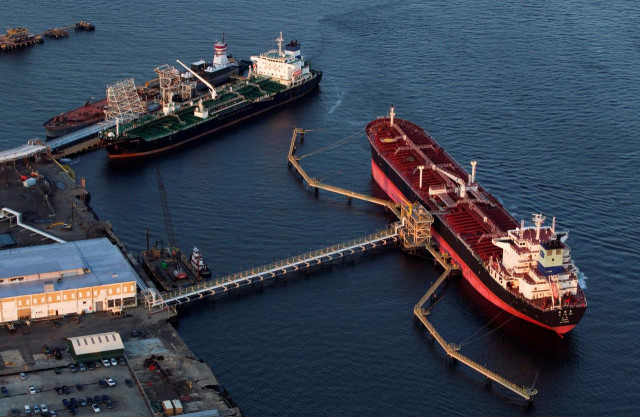Import of petroleum products drops 38% in August
It comes following global oil price recovery, less reliance on oil-based power plants

It comes following global oil price recovery, less reliance on oil-based power plants. PHOTO: REUTERS
Import of petroleum products including furnace oil, diesel, petrol and raw crude fell markedly in August, according to the Pakistan Bureau of Statistics (PBS).
Surprisingly, exports of refined petroleum products rose in the month, indicating domestic oil refineries were reluctant to build inventories for one reason or the other.
The statistics came following a number of developments including a sharp recovery in global crude oil prices and a major shift in the domestic market where car drivers switched from petrol to compressed natural gas (CNG).
Apart from these, the government's less reliance on oil-based power plants and a flat growth in the large-scale manufacturing sector - cement, steel, fertiliser and auto industries - restricted the demand for petroleum products, experts said.
Govt expects ambitious Rs486b in revenues from oil, gas firms
The drop in demand may also be partially attributed to a halt to business expansions, including those planned by foreign firms, before clarity emerges on the economic front as the Pakistan Tehreek-e-Insaf (PTI) government is currently reshaping policies.
PBS data
According to the PBS, the import of petroleum products dropped 38% to 912,370 tons in August compared to 1.46 million tons in the corresponding month of previous year.
Import of crude oil fell 6% to 948,787 tons compared to 1 million tons in August 2017.
In terms of value, however, the import of all fuel products including liquefied natural gas (LNG) surged 26% to $1.37 billion, which amounted to over one-fourth of the total import bill of $4.99 billion in August.
The rise in import value came after a 60% recovery in the Brent crude oil price in the last one year, which stood at a four-year high of $80 per barrel in the world market on Friday.
On the other hand, exports of petroleum products (raw and refined) surged over six times to $58.45 million in August this year compared to a mere $9.07 million in August 2017.
Oil consumers likely to cough up Rs48b in taxes in just 18 days
The surge in exports from the country, which heavily relies on imported fuels, is not less than a surprise as it meets over 70% of needs through imported fuels.
In volumetric terms, exports of petroleum crude increased 100% to 46,936 tons, export of petroleum products rose four times to 23,468 tons and export of petroleum naphtha surged 51% to 24,295 tons in August on a year-on-year basis.
Expert comments
Experts including Economic Advisory Council member Dr Ashfaque Hasan Khan, Arif Habib Limited Head of Research Samiullah Tariq and Topline Securities' analyst Umair Naseer agreed that the drop in imports hinted at economic slowdown in the country.
"The fall in imports (including those of petroleum products) indicates economic slowdown," Khan said cautiously in comments to The Express Tribune the other day.
With CPEC, demand for petroleum products set to grow
"A flat growth in large-scale manufacturing suggests a slowdown in the economy," Naseer said.
The reasons behind the flat growth were 18% rupee depreciation and a 175-basis-point hike in the benchmark interest rate to 7.5% in the last nine months.
The previous PML-N government had set a GDP growth target of 6.2% for the current fiscal year. However, many brokerage houses have projected a growth rate of around 4.7-4.8%.
Naseer said the uptrend in global oil prices and domestic markets had convinced transporters to shift to CNG fuel. The situation brought down the demand for oil.
Refineries may have exported naphtha (a raw material of petrol) to remove inventories, which, at one point in the near past, were going to spill over and threatened to stop operations.



















COMMENTS
Comments are moderated and generally will be posted if they are on-topic and not abusive.
For more information, please see our Comments FAQ